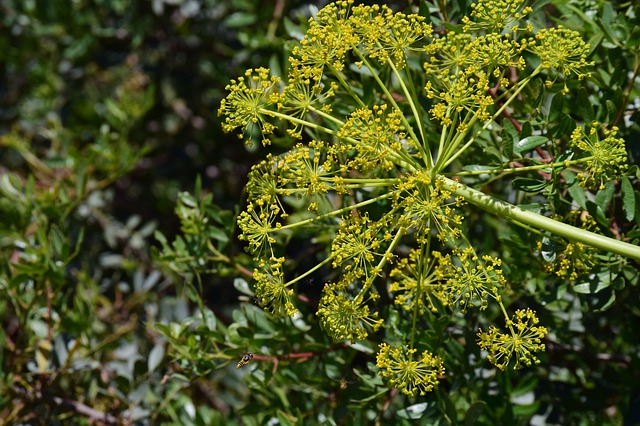Fennel Seed

Also known as...Foeniculum vulgare and Anethum foeniculum, Bari-Sanuf, Bitter Fennel, Carosella, Common Fennel, Fennel Oil, Fennel Seed, Finnochio, Florence Fennel, Foeniculi antheroleum, Foeniculum officinale, Foeniculum capillaceum, Garden Fennel, Large Fennel, Sanuf, Shatapuspha, Sweet Fennel, Wild Fennel.
Introduction
Fennel's name comes from the Latin foeniculum, meaning "little hay". The Roman historian Pliny recorded that when snakes shed their skins, they ate fennel to restore their sight (although he did not record how he made this observation). Pliny's observation led to the popular use in Europe of a cooled tea of fennel seed which was used as a wash for eyestrain and eye irritations. Chinese and Hindus employed fennel seed as a treatment for snakebite and Medieval Europeans used fennel seed as a treatment for obesity. Several liquors are flavored with fennel, including aquavit, gin, absinthe and fennouillete. All the above-ground parts of the fennel plant are edible. Fennel "seeds" are actually whole fruits, the most aromatic seeds found in the center of the seed head. In seed, a bright green color indicates quality. The herb should be stored in a tightly closed container in a cool, dry place.
Constituents
The essential oil contains anethole (50 to 80%), limonene (5%), fenchone (5%), estragole (methyl-chavicol), safrole, a-pinene (0.5%), camphene, b-pinene, b-myrcene and p-cymene. The seed also contains fiber and complex carbohydrates.
Parts Used
The "fruit" or seed dried and used whole or ground.
Typical Preparations
Used in cooking whole or ground as an excellent spice, also used to make herbal teas and in laxative preparations. Combined with chamomile and/or melissa in teas for colic. Combined with licorice, thyme, and/or poplar buds to treat colds, coughs, and congestion. Combined with chamomile, saffron, anise, caraway, licorice, and cardamom to treat asthma. For convenience, or if you do not like the flavor, it may be taken as an extract or capsule.
Summary
Fennel seed is antiseptic and secretolytic, that is, encouraging secretion of saliva and gastric juices. It also stops stomach cramps, often added to laxatives to ensure gentle action. Fennel seed teas break up congestion caused by colds and allergies. There are preliminary studies that suggest that regular consumption of fennel (as well as regular consumption of green beans, mushrooms, oranges, prunes, and celeriac) might slow the progression of osteoporosis. Fennel seed powder has almost exactly the same taste and medicinal effect as whole fennel seed, except it tends to lose anethole. Powdering makes fennel a less estrogenic herb, that is, less likely to stimulate the production of estrogen in women, a characteristic that may be desirable or undesirable depending on the user.
Precautions
Fennel seed teas are helpful for colicky infants, but fennel seed oil should never be given to infants or young children because of the danger of spasms of the throat.
For educational purposes only. This information has not been evaluated by the Food and Drug Administration.
This information is not intended to diagnose, treat, cure, or prevent any disease.
This information courtesy of MOUNTAIN ROSE HERBS, with full, written permission for reuse. For further traditional information concerning Fennel and Fennel Seed , please visit this excellent resource fromBotanical.com. Used with full, written permission.







